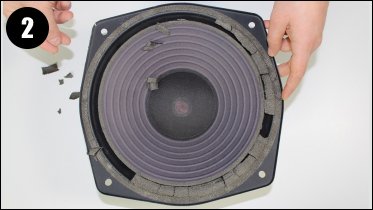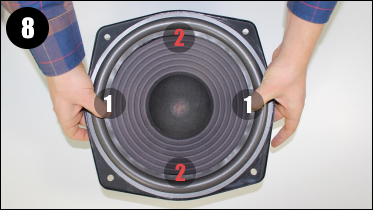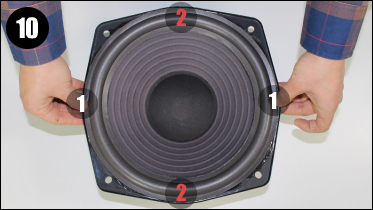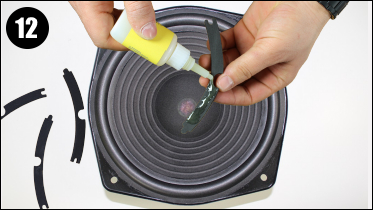Repair instruction
|
 |
 |
 |
| 1: If there is a gasket on top of the old foam, Carefully remove it with the utility knife and set it aside to reuse later. Carefully insert a sharp utility knife between the gasket and the old surround. Slowly work your way around the gasket. Prying it off until the original glue seam is broken. Scrape away any remaining foam from back of gasket. |
2: Remove any and all foam residue from the speaker frame an cone. You don’t necessarily have to remove all of the glue residue, but you must remove all of the foam residue. |
 |
 |
| 3: Apply Foam Remover to foam and glue residue around edge of frame and cone. Warning! Do not apply foam remover to the cone. it will hurt the some cone. Allow to soak for 3-4 min. |
4: Scrape all remaining foam or glue from frame with edge of utility knife or wood chisel, making sure not to damage the cone. Use your fingers to rub off the remaining foam particles from the cone's edge. Remove as much foam as you can, but leaving a thin layer is acceptable. |
 |
 |
| 5: Before gluing, check for proper cone and frame fit. If you are precise, draw a line before gluing. |
6: Small variances of less than 1/8” are OK. If the new edge fits cone, but the outer lip is too large for the frame, trim the outer diameter of the foam edge as needed. |
 |
 |
| 7: Apply 1/8" bead of adhesive to flat lip on cone edge or to underside lip of foam if cone is angle attach style. Smooth adhesive uniformly and immediately apply to cone. Some wrinkling of the new foam is normal and will subside as the adhesive cures. |
8: Use your finger tip to smooth the adhesive uniformly and then install the foam to the cone while the adhesive is still wet and tacky. Install the new foam edge onto the cone. You can move the foam and make adjustments as needed at this time. Be sure to center the foam on the cone. In most cases it is easier to install the new foam to the TOP of the cone even if the original foam was installed behind the cone. Allow to dry for 20 min. |
 |
 |
| 9: Insert the tip of your glue tube under the outer lip of the foam edge to apply a bead of adhesive around the frame. Press lightly on top of the foam to distribute the adhesive. |
10: Use your finger tip to smooth the adhesive uniformly and then install the foam to the frame while the adhesive is still wet and tacky. Install the new foam edge onto the frame. You can move the foam and make adjustments as needed at this time. |
 |
 |
| 11: While the adhesive is still wet, exercise the cone by pressing down evenly around the dust cap to center the cone and voice coil. Notice how the cone can easily be moved in one direction or the other to easily find the "sweet spot" where there is no scraping or friction of the voice coil. Be sure to center the foam on the cone and frame. |
12: Apply adhesive to the top of the foam and install the gasket removed earlier (if applicable). Place the speaker gasket side down and allow to dry for 20 min. |
I have never repaired speakers before, can I repair them myself?
We are at service for 5 years as online shop and thousands of people successfuly repaired their speakers themselves.
The new surround is slightly larger than the speaker basket, can I cut the edges of it?
You can cut the edges of the surround with a scissors and overlap the foam to make it smaller as needed to fit speaker basket.
Foam surround vs Rubber surround?
surround is produced from polyether, very light due to the polyether's nature and micro bubbles give it a more flexible form so it could move in the magnet easly. Rubber surround is produced from plastic (GMO). It is heavier comparison to polyether and the motion of the rubber surround in the magnet is limited. Hence the sound quailty differs. Most of the speaker producing company uses foam surround.
One of my surround is worn up, should I change the other one too?
No, if you mind the look of it being different to the other, you can change the other one too.
Do you have a speaker repair service?
Yes, we have. Learn more about repair service here.
Do I need shims?
Shims are not needed to properly replace speaker foam surround using our special adhesive and repair technique. Hand centering is easy and just as accurate. See repair- video.
Can I use surround adhesive for dust cap?
Surround adhesive supplied with your kit is specially formulated for speaker repair. It will attach foam or rubber surround, dust caps to all types of cones including Poly, Paper, Kewlar and aluminum.set time to dry is 30 min.
It took under an hour and the new surrounds for my 250ML speakers look great. Don't spread the glue with your finger, use the glue bottle spout to spread the glue on the cone & surround. I found it easier to position and work the new surround on the cone if you spread the glue on the underside of the surround and the top of the cone.
I am very happy that I was able to restore these 35+ year old speakers.
Thank-You, Joe
P.S. the shipping to Canada was fast with no extra duty/ tax charges.
finger, use the glue bottle spout to spread the glue on the cone & surround. I found it easier to position and work the new surround on the cone if you spread the glue on the underside of the surround and the top of the cone.
I am very happy that I was able to restore these 35+ year old speakers.
Thank-You, Joe
P.S. the shipping to Canada was fast with no extra duty/ tax charges.
go to post